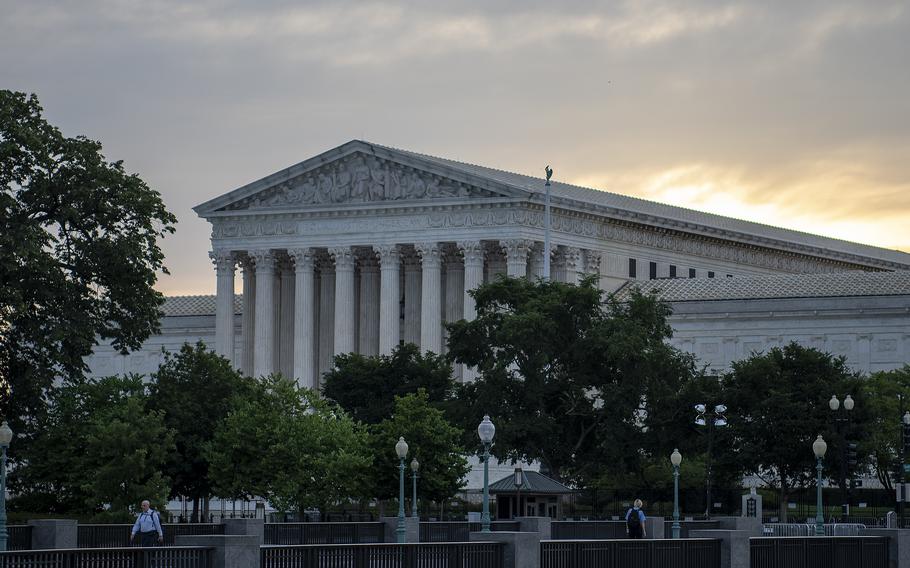A new report from the Department of Labor calls on Congress to codify into law a Supreme Court decision that allows service members to take state employers to court if they feel the state has violated federal laws that ban discrimination against employees because of their military service.
The recommendation is part of an annual report to Congress last month by the department, which oversees implementation of the Uniformed Services Employment and Reemployment Rights Act of 1994, or USERRA.
The legislation protects military service members and veterans from employment discrimination because of their service, and allows them to regain their civilian jobs after uniformed service.
The Supreme Court decision came in Torres v. Texas Department of Public Safety, in which a retired Army Reserve captain, Le Roy Torres, sued the state agency in 2017 for allegedly forcing him from his job as a state trooper due to injuries suffered while serving Iraq about 10 years earlier.
The state argued sovereign immunity, which meant it could not be sued without its consent.
In a 5-4 decision issued in June, the court ruled that sovereign immunity does not prevent states from being sued under federal law related to national defense.
Despite the court decision, the Labor Department urged Congress to codify the ruling into law.
“Even though it is a Supreme Court precedent, you may see additional cases raising that issue. And if it's codified it really helps increase awareness,” Labor Department official Kenan Torrans said.
Inquiries about possible violations of the USERRA act have increased over the last year, probably because Guard and Reserve troops played an important role in efforts to prevent the spread of the coronavirus, said Julie A. Weckerlein, spokeswoman for the Defense Department’s Employer Support of the Guard and Reserve, or ESGR.
The agency’s call center received 17,927 inquiries in fiscal year 2021, up from 14,631 in 2020, according to the report. They field calls from service members and employers with questions about USERRA, she said.
When needed, ESGR can help mediate or refer the service member to the Department of Labor, which can investigate if a violation occurred.
The increase in queries can also be attributed to more outreach, Weckerlein said. As the pandemic eased, ESGR’s volunteers were able to go out and meet with people in person again, which helps raise awareness about USERRA.
However, the increase in call volume didn’t mean more violations were found. The Labor Department report found that of all the calls last year, just 1,134 resulted in mediation cases. That’s down from 1,306 in 2020.
“Every contact that’s made is not necessarily going to require elevation,” Weckerlein said. “The goal is to offer that mediation so that there's a resolution at the lowest level. And, as it says in our name, we offer support to the employers as well.
Resolving a complaint at a lower level also keeps the employer-employee relationship in better standing, Torrans said.
“When a case goes to litigation, and they do sometimes … the employer-employee relationship becomes hostile at that point,” he said. “In our experience, the vast majority of employers are very supportive of their service member and veteran employees, and they want to do the right thing.
“So many disputes that arise under the law are the result of a lack of understanding in respect to the rights and obligations under the statute.”
Just over half the violations are related to discrimination over military obligations, according to the report. Reinstatement accounts for about 23% of violations.
Not all USERRA cases are handled through the government. Service members also have the option of using a private attorney in the civil court system, such as Torres did when he filed suit against the Texas Department of Public Safety.
His attorney, Brian Lawler, is a Marine Corps veteran who works primarily on USERRA issues, said success in such cases typically mean the service member is compensated for lost wages, or offered reemployment.
The amounts are not always high, but he said it’s important to still hold employers accountable for the law.
“If we were to let those go and not be addressed, then the employers were incentivized to keep doing it,” Lawler said.

The Supreme Court as seen in Washington, D.C., on July 6, 2022. (Carlos Bongioanni/Stars and Stripes)